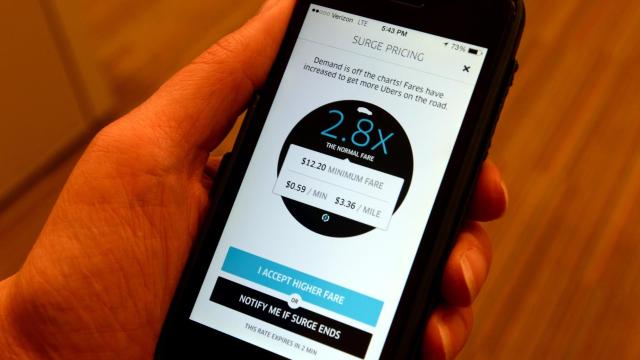Users of ride hailing apps Uber and Lyft say they were fleeced after they tried to leave the Brooklyn area yesterday after a shooting left at least 23 people injured. Others found the price of a ride had increased several fold even in areas outside the immediate area of danger.
The tragedy unfolding in Brooklyn yesterday was reason enough for many people to avoid the subways and summon an Uber, but when users looked at the total bill, they were greeted with a notice that “Fares are slightly higher due to increased demand” and shocked at prices well above normal. Some saw prices nearly double what they should would be.
On Twitter, one user tweeted that a short trip, which should only take 11 minutes by car, would cost them close to $US100 ($139).
@Uber cashing in on this tragic event #uber #sunsetpark pic.twitter.com/WqZnBAMlL7
— Roger Gonzalez (@its_misterjay) April 12, 2022
Other fares saw similar increases.
@Uber turn off surges in sunset park. People are scared, let them get out safely pic.twitter.com/e31KIPE3ND
— Shannon McDonagh (@shananigans022) April 12, 2022
The price surges occurred as a result of systems that automatically increase prices during times of peak usage. Lyft’s “Prime Time” system, for instance, kicks in when ridership outpaces the number of available cars. The company says that incentivizes more of its drivers to start a shift, in order to match demand.
But in cases of public safety emergencies or natural disasters, the automatic price increases can backfire. Uber spokesperson Josh Gold said in a statement that Uber manually disabled surge pricing in the vicinity of the shootings soon after the system turned them on, and capped pricing across the entire city. Lyft took similar measures.
Both companies are maintaining caps on surge pricing for now, but did not specify how long the caps will remain in place. They have also promised to refund users affected by the surge; A Lyft spokesperson said those refunds might take a few days to roll out, but users will not have to do anything on their end to get the refund, and the refunds will not impact drivers’ earnings.
As Brooklynites return to work today, Lyft says it will offer discounted rides through the 15th in the area. A representative could not say if any of its systems would change permanently in response to this event.
Uber, on the other hand, has a system in place that is supposed to recognise when an emergency is taking place and cap congestion pricing. The company did not comment on why it didn’t prevent this incident, but promised that it will “review situations where unintended charges might have occurred during an emergency and work to refund them. Customers can always report issues through the app.”
While ridership numbers are not yet available from the MTA for Tuesday, many regular subway riders fear taking their usual underground commute the day after the shooting.
Uber has previously been criticised before for trying to eek out as much money from users as possible. It is currently being taken to court by federal prosecutors for allegedly charging more for disabled users who take more time to enter the rides.
Both companies will need to figure out how to prevent these inappropriate surge prices in the future, especially since regular taxi rides will be facilitated using ride-sharing apps in the near future.
